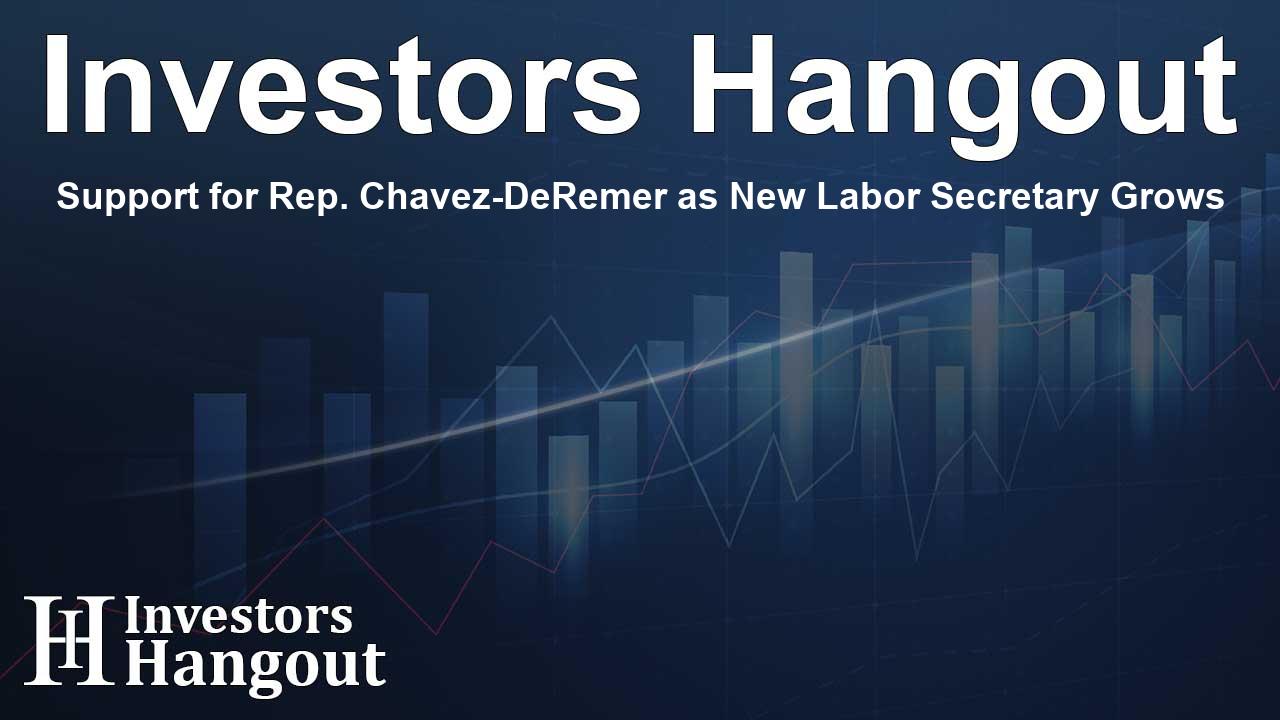Support for Rep. Chavez-DeRemer as New Labor Secretary Grows

Support for Employee Ownership Grows with New Campaign
In a remarkable move, the ESOP Association, a prominent entity championing businesses with an Employee Stock Ownership Plan (ESOP), has unveiled an ambitious six-figure campaign. This endeavor aims to bolster support for Rep. Lori Chavez-DeRemer, who has been nominated for the role of Secretary of Labor.
Importance of Employee Ownership
The association represents a substantial segment of the workforce, encompassing about 14 million Americans engaged in businesses with ESOP structures. The organization is keen on advocating for policies that enhance employee ownership, believing that these practices lead not just to better workplace culture, but also contribute significantly to economic resilience.
Backing from the ESOP Association
James Bonham, the President and CEO of the ESOP Association, expressed strong support for Rep. Chavez-DeRemer, stating, "Representative Chavez-DeRemer is an outstanding choice to lead the U.S. Department of Labor. We will mobilize all our resources to make sure she receives the confirmation she deserves from the Senate.” He highlighted her impressive track record in supporting ESOP businesses, pointing to her awareness of how legislation and regulation can impact operational success.
Campaign Plans to Garner Support
The campaign will engage a variety of strategies to ensure optimal success. According to the ESOP Association, they plan to:
- Deploy volunteer leadership from chapters nationwide to advocate directly with Senate members.
- Activate the Employee Owner Action Network, which has a vast base of over 30,000 individuals, to facilitate communications directed to Senators advocating for Chavez-DeRemer's confirmation.
- Launch paid advertising campaigns that promote her nomination and emphasize the importance of employee ownership.
- Leverage longstanding relationships with bipartisan lawmakers to build a solid case for her confirmation.
Economic Impacts of ESOPs
There are currently more than 6,700 ESOP businesses across the United States, contributing over $2 trillion in assets to the economy. These employee-owned companies also directly support over 14 million American households. Beyond just wages and benefits, ESOPs disperse over $175 billion annually to employee owners, showcasing their crucial role in economic stability and growth.
Chavez-DeRemer’s Commitment to ESOPs
Since her entry into Congress, Rep. Chavez-DeRemer has shown unwavering advocacy for employee ownership principles. She has taken the initiative to visit various ESOP companies, engaging with employees and discussing legislative matters crucial to the sector. Her involvement in the Employee Equity Investment Act highlights her commitment, as it seeks to simplify transitions to employee ownership for businesses, thereby creating more opportunities for the workforce.
Recognition from the ESOP Community
Bonham emphasized, "Rep. Chavez-DeRemer truly understands the potential of employee ownership as a catalyst for economic growth. Her leadership would surely promote avenues for millions to achieve financial security through these employee-driven businesses." These sentiments reflect the broader support she receives within the ESOP community, advocating for a future where employee ownership flourishes in diverse sectors of the economy.
About The ESOP Association
The ESOP Association stands as the largest global organization advocating for employee-owned companies. With over 10 million employees participating in ESOPs, it plays a pivotal role in providing resources and support to both employees and professionals involved in employee ownership. Positioned at the International Employee Ownership Center, the Association organizes numerous conferences throughout the year, facilitating networking and advocacy efforts among its members.
Frequently Asked Questions
What is the purpose of the campaign by the ESOP Association?
The primary goal of the campaign is to support Rep. Lori Chavez-DeRemer's confirmation as Secretary of Labor and promote employee ownership across the U.S.
How many businesses have ESOPs in the United States?
There are over 6,700 businesses in the U.S. with Employee Stock Ownership Plans.
Why is employee ownership important?
Employee ownership enhances workplace culture, boosts economic resilience, and provides financial security to workers.
What initiatives does Rep. Chavez-DeRemer support?
She supports various initiatives, including the Employee Equity Investment Act, facilitating smoother transitions to employee ownership.
Who benefits from the activities of the ESOP Association?
The ESOP Association benefits both employee owners and the professionals who support the development of employee ownership models.
About Investors Hangout
Investors Hangout is a leading online stock forum for financial discussion and learning, offering a wide range of free tools and resources. It draws in traders of all levels, who exchange market knowledge, investigate trading tactics, and keep an eye on industry developments in real time. Featuring financial articles, stock message boards, quotes, charts, company profiles, and live news updates. Through cooperative learning and a wealth of informational resources, it helps users from novices creating their first portfolios to experts honing their techniques. Join Investors Hangout today: https://investorshangout.com/
Disclaimer: The content of this article is solely for general informational purposes only; it does not represent legal, financial, or investment advice. Investors Hangout does not offer financial advice; the author is not a licensed financial advisor. Consult a qualified advisor before making any financial or investment decisions based on this article. The author's interpretation of publicly available data shapes the opinions presented here; as a result, they should not be taken as advice to purchase, sell, or hold any securities mentioned or any other investments. The author does not guarantee the accuracy, completeness, or timeliness of any material, providing it "as is." Information and market conditions may change; past performance is not indicative of future outcomes. If any of the material offered here is inaccurate, please contact us for corrections.